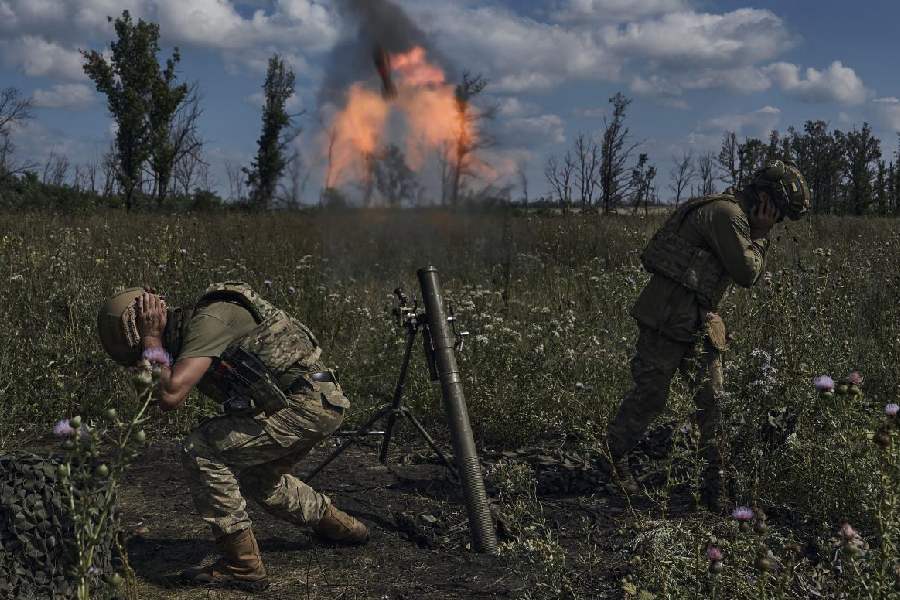A Ukrainian marine infantryman endured nine months of physical and psychological torture as a Russian prisoner of war, but was allotted only three months of rest and rehabilitation before being ordered back to his unit.
The infantryman, who asked to be identified only by his call sign, Smiley, returned to duty willingly. But it was only when he underwent intensive combat training in the weeks after that, the depth and range of his injuries, both psychological and physical, began to surface.
“I started having flashbacks, and nightmares,” he said. “I would only sleep for two hours and wake up with my sleeping bag soaking wet.” He was diagnosed with post-traumatic stress disorder and referred for psychological care and is still receiving treatment.
Ukraine is just beginning to understand the lasting effects of the traumas its prisoners of war experienced in Russian captivity, but it has been failing to treat them properly and returning them to duty too early, say former prisoners, officials and psychologists familiar with individual cases.
Nearly 3,000 Ukrainian prisoners of war have been released from Russia in prisoner exchanges since the 2022 invasion began. More than 10,000 more remain in Russian custody, some of whom have endured two years of conditions that a United Nations expert described as horrific.
The Ukrainian government’s rehabilitation programme — which usually involves two months in a sanitarium and a month at home — is inadequate, critics say, and the traumas suffered by Ukrainian prisoners are growing with the length and severity of the abuse they are being subjected to as the war drags on.
Russia’s torture of prisoners of war has been well documented by the United Nations, with former inmates speaking of relentless beatings, electric shocks, rape, sexual violence and mock executions, so much so that one expert described it as a systematic, state-endorsed policy. Many detainees have also reported lingering symptoms like blackouts and fainting spells stemming from repeated blows to the head that were severe enough to cause concussions.
Ukraine’s prosecutor-general Andriy Kostin said in September that “about 90 per cent of Ukrainian prisoners of war have been subjected to torture, rape, threats of sexual violence or other forms of ill-treatment.”
The Russian military did not answer a request for comment on the allegations of mistreatment of Ukrainian prisoners of war.
Most of the released prisoners have returned to active duty after about three months of rest and rehabilitation, as the Ukrainian military, short of troops on the front line, has given relatively few medical exemptions to former prisoners of war.
A law passed this month will allow former prisoners of war the choice of returning to service or being discharged from the military, recognising that many have been subjected to severe mental and physical torture and need prolonged rehabilitation. Ukrainian officials acknowledged that there have been problems in providing sufficient care for former prisoners, but said they had now developed special centres for them using best international practices.
Ukrainian prosecutors have identified 3,000 former military and civilian prisoners who can serve as witnesses for a case they are building for the Ukrainian courts to charge Russian individuals and officials with mistreatment of prisoners. The prosecutors encouraged two of the former prisoners to speak to The New York Times.
One of them was Smiley, 22, who was captured at the beginning of the war when the Russian Navy seized Ukrainian positions on Snake Island in the Black Sea. He spoke a year after his release, saying he hoped that shedding light on the conditions of Russian prisons would help not only his own rehabilitation but also the thousands of prisoners of war still in captivity.
“My sister persuaded me to give my first interview,” he said. “‘You need to tell,’ she said. Maybe if we speak, it will help the treatment of our guys.”
A second Ukrainian serviceman made available by the prosecutors gave a lengthy interview but declined to give his name or call sign, because of the stigma surrounding the abuses he suffered.
The serviceman, 36, said he was taken prisoner along with several thousand soldiers and marines after a long siege at the Azovstal Iron and Steel Works in Mariupol in May 2022. He spent nine months in Russian captivity before being released in a prisoner exchange in early 2023.
He spent most of his time in three detention facilities in the Russian towns of Taganrog, Kamensk-Shakhtinsky and Kursk. He returned critically underweight and suffering from an injured spine and, like many others, blackouts, dizziness and ringing in the ears from frequent beatings on the head.
“I am not fainting any longer,” the serviceman said, “but I have difficulties with my back and concussion, and a squeezing all the time of the area around my heart.” Despite his injuries, he was ordered to return to light duty as a guard after only two months’ rest in a sanitarium.
“I don’t know if I could run a kilometre,” he said.
New York Times News Service











